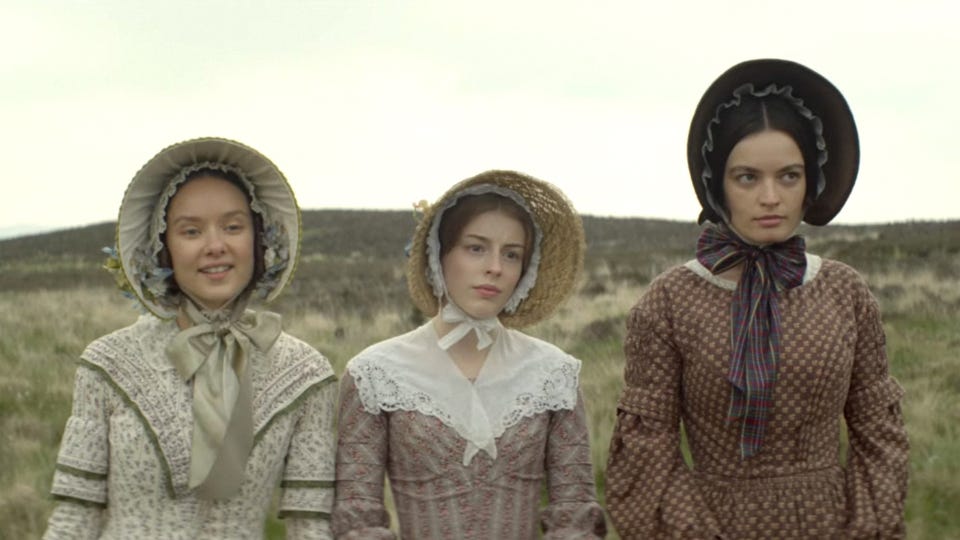What to Watch: Literary Lions, Donkeys, and Cocaine Bears, Oh My.
Reviews of "Emily" (⭐⭐⭐), "EO" (⭐⭐⭐⭐), and, yes,"Cocaine Bear" (⭐⭐1/2).
There’s an extremely varied roster of new films in theaters and on VOD this week – the kind of cinematic slumgullion that’s fun to write about, from Gothic novelists to wandering donkeys to Cocaine Bears. Come with me, won’t you, as we tour the peaks and valleys of the release schedule?
I tend to approach literary biopics with a ten-foot pole and a hazmat suit, if only because they so profoundly misrepresent the creative act of writing. You know what I mean: The famous author (played by a far shapelier actor than the actual historical figure) will put down his or her glass of laudanum, stare at a blank sheet of paper, and then the words will just come, unbidden, taking form in the air – sometimes literally – and landing on the page exactly as we know them. No first drafts or scratched-out rewrites; no writer’s block or midnight doubts. No coffee! There was a pretty terrible Dylan Thomas drama a number of years ago (“The Edge of Love,” 2009) that to my mind stands as the poster child for this kind of bollocks, and so I approached “Emily” (⭐⭐⭐, in theaters), the new drama about Emily Brontë’s tempestuous life before writing “Wuthering Heights,” with a pillar of salt and escape routes noted.
I shouldn’t have worried too much: “Emily” is a good, engrossing watch, and it avoids most (but not all) of the genre’s pitfalls. Under the direction of Frances O’Connor – an established Australian actress making a strong debut behind the camera -- the movie opens in full swoon and remains at a pitch of tremulous Gothic romanticism throughout — but knowingly, without falling into kitsch on one hand or brittle irony on the other. (A burbling Philip Glass-esque score by Abel Korzeniowski helps maintain the balance.) O’Connor has enough distance on the writer to keep from stale notions of Great Artists and Great Art, but she wants us to understand that the harsh beauty of Emily Brontë’s writing was informed by the landscape and culture in which she lived. And she has Emma Mackey (above) as Emily, which counts for a lot.
Mackey is best known for playing a world-weary teenager on the ribald Netflix series “Sex Education,” a role that has become increasingly absurd as the show heads into its fourth season and the actress gets within shouting distance of 30. (If she’s a high school senior, I’m Tallulah Bankhead.) “Emily” gives her a welcome out, and Mackey is very, very good as the strangest and most untamed of the Brontë sisters. O’Connor’s script posits a stormy (and wholly fictional) romance between Emily and a handsome young curate that will ultimately serve as the inspiration for her novel, and while parts of the movie paddle about in rewarmed Jane Austen waters – the curate is named Mr. Darcy Mr. Knightley Mr. Weightman (Oliver Jackson-Cohen) – the bodice-ripping, when it comes, is thorough. Indeed, I don’t know that I’ve seen a scene of two people undressing each other that was so simultaneously erotic, impatient, and funny.
Mackey has in her arsenal a pair of eyes just slightly smaller than Gollum’s, and she uses them to suggest Emily’s ardor – a woman living on the knife-edge of her senses – as well as a madness that seems less romanticized than a whole lot of trouble. In O’Connor’s telling, Charlotte Brontë (Alexandra Dowling) is the Good Sister, dutifully prim and embarrassed by this sibling that the cat has dragged in off the moors; Amelia Gething plays Anne, the gentle youngest Brontë; and Fionn Whitehead (“Dunkirk”) is a roistering Branwell, Emily’s companion in scandal but doomed by his addictions and – much worse – his inability to write a decent sentence. (Adrian Dunbar glowers effectively as their uncomprehending father.) “Emily” eventually caves in to the strict demands of the Great Artist Biopic: There is that blank sheet of paper miraculously filled and enough fiddling with the historical record to annoy any English M.A.s in the audience. (“Wuthering Heights” was initially published under the pseudonym “Ellis Bell,” not with Emily’s real name as shown here; Charlotte’s “Jane Eyre” came out before “Heights,” not after, and it certainly wasn’t written as a result of Emily “liberating” her sister’s muse.)
But when the movie hits, it hits hard. A third of the way in, the sisters are playing with Mr. Weightman a variation of Twenty Questions where the player puts on an eerily expressionless mask and pretends to be a famous person that the others have to guess. When Emily’s turn comes, the movie leaps off the cliff into a moment of possession or performance – or both – that freaks out everyone in the room and, to be honest, anyone watching the movie. It may be the only scene where O’Connor and Mackey convey the unearthly majesty and cruelty – the danger – careening around inside this woman. But it’s enough.
From the sublime to the sublimely ridiculous: What do you want out of a movie called “Cocaine Bear” (⭐⭐1/2, in theaters)? A movie as stupid as its title or a movie that knows it’s as stupid as its title? The trick with this kind of “Hey, look, we’re making a crappy movie” movie – as it was with such cultural landmarks as “Snakes on a Plane” and “Sharknado” – lies in locating the line between wink-wink smugness and Just Plain Dumb, and while “Cocaine Bear” mostly succeeds at the task, it’s still low-end comedy-horror schlock, no more and no less. The premise is that several duffel bags of cocaine have been air-dropped into a Georgia national park and snarfed up by a black bear, which proceeds to rampage through a series of unlucky rangers (Margo Martindale), moms (Keri Russell) and kids (Brooklynn Prince of “The Florida Project” and an amusingly potty-mouthed Christian Convery), two low-level drug goons (testy O’Shea Jackson and weepy Alden Ehrenreich), a cop (Isiah Whitlock, Jr.), an EMT or two, and, if I’m processing this correctly, a trio of adolescent National Parks gangbangers. Under Elizabeth Banks’ workmanlike direction, there are enough actual laughs to keep it respectable and just enough graphic gore to keep it disreputable, but “Cocaine Bear” may be best remembered in the end as one of the final screen appearances of Ray Liotta, playing (what else?) a slimy coke kingpin and ringing down the curtain on a stellar career by (spoiler alert) getting disemboweled by bear cubs. (N.B. “Cocaine Bear” is based on the real 1985 case of a black bear that ate 75 pounds of cocaine it found in the woods. That bear did not go on a campy rampage. That bear died and is now stuffed and on display in the Kentucky Fun Mall in Lexington, KY. Because America.)
Speaking of animals, 2022 was a very good year for donkeys in cinema: sweet Jenny in “The Banshees of Inisherin,” the unlucky beast eaten by the cast of “Triangle of Sadness,” and, above all, the title character of “EO” (⭐⭐⭐⭐, streaming on the Criterion Channel or for rent on Amazon, Apple TV, and Vudu), Jerzy Skolimowski’s deeply affecting drama of animal consciousness. At 84, the Polish director is doing some of his finest work, and “EO” is a highlight in a long, bumpy, but rich career. An Oscar nominee for best international film, it’s a transcendently simple story that starts with EO (say it like you’re a donkey) in a traveling circus, tended by a loving owner (Sandra Drzymalska), before embarking on a long, cross-Europe odyssey that is less allegorical than an uninflected gaze at the human animal as seen through the eyes of an ass. There are moments of kindness and cruelty (Skolimowski, an avowed animal-rights activist, has said no creature was hurt during the making of the film), appearances by the occasional movie star (Isabelle Huppert as a plate-smashing countess), and a kind of widescreen snapshot of existence on Earth that underscores man’s frail dominance while insisting on the endurance of the beasts we think are somehow less than us. As such, “EO” is not so much a remake of the director’s acknowledged source as his own late-life contribution to the conversation.
Thankfully, that source is also streaming on the Criterion Channel (and for rent on Amazon and Apple TV): Robert Bresson’s 1966 masterpiece “Au Hasard Balthazar” (⭐⭐⭐⭐), a movie that similarly follows the life of a donkey but with an undercurrent of allegorical Christian passion play that can break the heart of all who see it, believer and atheist alike. (“Balthazar” is in my own personal all-time Top Ten – I’d give the movie five stars if I could – and I wrote about it for the Boston Globe back in 2004; forgive some weird typos in the archived version.) Criterion has added extras to its “EO” package in the form of a half-hour conversation between Skolimowski and his collaborator and wife Ewa Piaskowa in which “Au Hasard Balthazar” is mentioned – the director says that seeing the movie in his late 20s replaced his youthful filmmaking arrogance with greater empathy – and a delightful 5-minute featurette about the six Sardinian donkeys who played EO, including the one they found on Facebook and the one who did all his stunts, just like Tom Cruise.
As if that isn’t enough, Criterion has programmed a Skolimowski package that puts together the director’s three best-known early films: “Deep End,” (1970, ⭐⭐⭐⭐), a brilliantly unsettling coming-of-age drama; “The Shout” (1978, ⭐⭐⭐) with Alan Bates as a drifter with a lethal voice; and “Moonlighting” (1982, ⭐⭐⭐⭐), featuring Jeremy Irons leading a group of Polish construction workers marooned in London. They’re all worth your time, but “Deep End” is the one that messed with my head most thoroughly when I saw it in college, with a 15-year-old John Moulder-Brown cast as a bathhouse attendant crushing on an older woman (Jane Asher, then best known as Paul McCartney’s ex-girlfriend) and a use of the color red (shared by “EO,” incidentally) that blossoms into something both beautiful and sinister. Throughout his career, Skolimowski has always languished somewhat in the shadow of his countryman (and elder by five years) Roman Polanski; it's a felicity that “EO” sees him at last take center stage where he belongs.
Two recent new (and new old) non-fiction titles on VOD: “The Wolfpack” (2015, ⭐⭐⭐, streaming on Prime Video, for rent elsewhere) – An intriguing documentary about a family of six boys whose mother kept them mostly inside a tiny Manhattan apartment until their adolescence. Surprise: They didn’t turn into psychos and watching them emerge blinking into the world is a heartening experience. Directed by Crystal Moselle, who likes stories of downtown misfits. (See: “Skate Kitchen” and HBO’s “Betty.”)
“All That Breathes” (2022, ⭐⭐⭐⭐, streaming on HBO Max) – The marvelous Oscar-nominated documentary about two brothers rescuing Black Kites as they fall out of the polluted skies of Delhi. As in “EO,” we are given a privileged view of the world as the creatures we fail to see see it.
Next week: Oscar nominated shorts, a new podcast, and a quiet Irish girl.
Thoughts? Don’t hesitate to weigh in.
If you enjoyed this edition of Ty Burr’s Watch List, please feel free to pass it along to friends.
If you’re not a paying subscriber and would like to sign up for additional postings and to join the discussions, here’s how.







